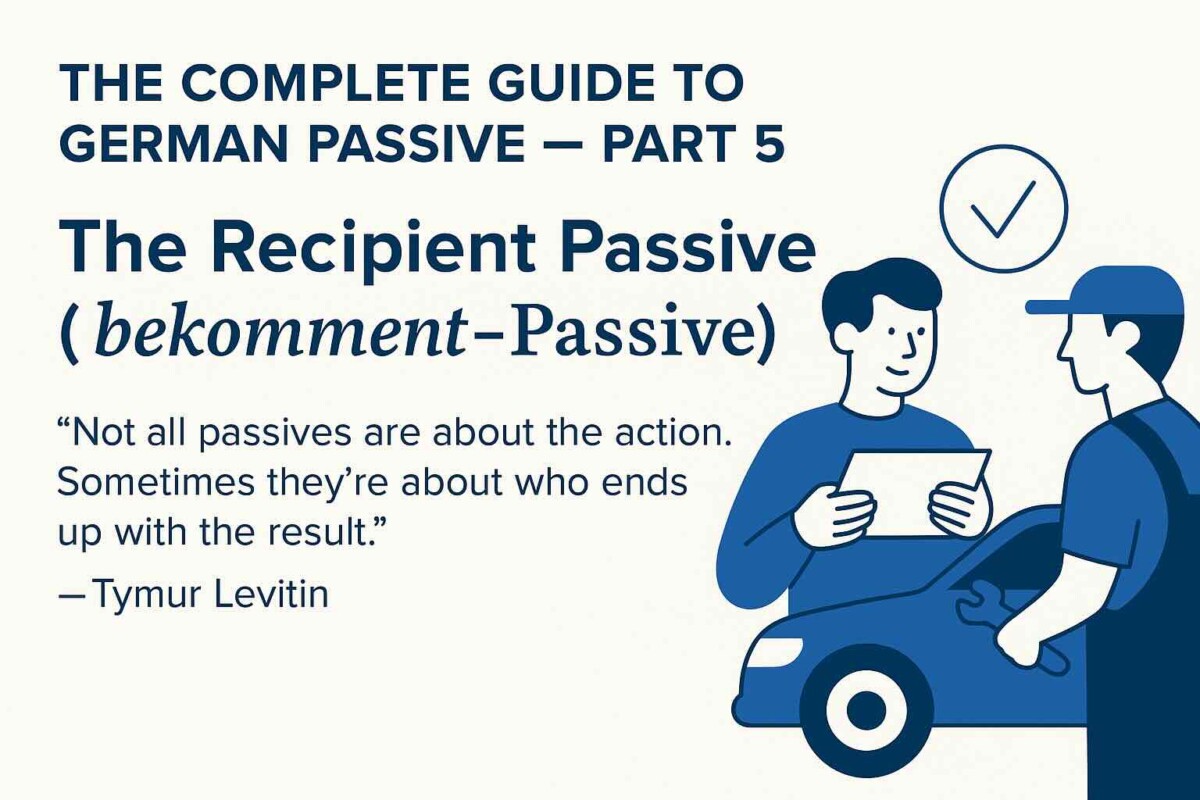The Recipient Passive (bekommen-Passive)
“Not all passives are about the action. Sometimes they’re about who ends up with the result.” - Tymur Levitin
The paradox before we start: is this even a passive?
Linguists still argue whether the bekommen-Passive is “true” passive or a separate construction.
- On the one hand, the subject receives the object → that looks passive.
- On the other hand, the verb form behaves differently from the werden-Passive.
👉 For exam practice, it is treated as a passive variant. For advanced analysis, it is often called a “recipient construction.”
What is the bekommen-Passive?
It’s a passive form that shifts the focus: the subject is not the agent (doer), but the recipient (receiver) of the action.
- Active: Der Mechaniker repariert dem Kunden das Auto.
→ “The mechanic repairs the car for the customer.” - Recipient passive: Der Kunde bekommt das Auto repariert.
→ “The customer gets the car repaired.”
Core structure
Subject (recipient) + bekommt / bekam / hat bekommen … + object in participle form
Ejemplos:
- Präsens: Er bekommt das Auto repariert. → “He gets the car repaired.”
- Präteritum: Er bekam das Auto repariert. → “He got the car repaired.”
- Perfekt: Er hat das Auto repariert bekommen. → “He has got the car repaired.”
Tense overview
| Tense | German form | English meaning |
|---|---|---|
| Präsens | Der Kunde bekommt das Auto repariert. | The customer gets the car repaired. |
| Präteritum | Der Kunde bekam das Auto repariert. | The customer got the car repaired. |
| Perfekt | Der Kunde hat das Auto repariert bekommen. | The customer has got the car repaired. |
| Plusquamperfekt | Der Kunde hatte das Auto repariert bekommen. | The customer had got the car repaired. |
| Futur I | Der Kunde wird das Auto repariert bekommen. | The customer will get the car repaired. |
| Futur II | Der Kunde wird das Auto repariert bekommen haben. | The customer will have got the car repaired. |
Comparison: werden-Passive vs bekommen-Passive
- Das Auto wird repariert.
→ The car is being repaired. (Action-passive: focus on the process.) - Der Kunde bekommt das Auto repariert.
→ The customer gets the car repaired. (Recipient-passive: focus on the person who benefits or suffers.)
Common traps
- Not all verbs allow it.
Only verbs with a direct and indirect object (so that there is a “recipient”).- Works: Der Student bekommt den Text übersetzt.
- Unnatural: Der Student bekommt geschlafen. (nonsense — no indirect object).
- Not always interchangeable with werden-Passive.
- Der Brief wird geschrieben. (action focus) ≠ Der Empfänger bekommt den Brief geschrieben. (awkward).
The bekommen-Passive is best with service-like or transfer-like actions.
- Der Brief wird geschrieben. (action focus) ≠ Der Empfänger bekommt den Brief geschrieben. (awkward).
- Sounds colloquial in some regions.
In spoken German it is common. In academic writing, limit use.
Variants: kriegen-Passive and erhalten-Passive
- Der Kunde kriegt das Auto repariert. (colloquial, common in North Germany)
- Der Kunde erhält das Auto repariert. (formal/literary, less frequent)
All three (bekommen, kriegen, erhalten) follow the same grammatical logic.
Exam survival
- When to use: when you need to emphasize the recipient, not the action.
- Safe tenses: Präsens, Präteritum, Perfekt are most common.
- Formal writing: prefer werden-Passive. Mention bekommen-Passive as an alternative.
- Colloquial speech: kriegen-Passive is very common, but don’t use it in exams.
Series navigation
- Part 1: Myth of Three Passive Forms
- Part 2: Passive Tenses Without Modals
- Part 3: Passive with Modal Verbs
- Part 4: All Tenses in Full
- Part 5: Recipient Passive (this page)
- Part 6: Impersonal Passive
- Part 7: Passive in Konjunktiv
- Part 8: Academic Passive
- Part 9: The Translation Lab
- Part 10: Survival Strategies
About the author
Tymur Levitin — Founder, Head Teacher & Translator
Author’s rights
© Tymur Levitin — Levitin Language School / Start Language School by Tymur Levitin
Aprendizaje global. Enfoque personal.
























